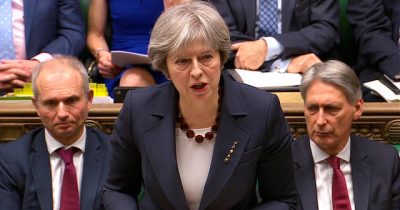Theresa May Ruled Out No-deal After Northern Ireland Terror Warning

Theresa May decided against allowing the UK to crash out of the EU without a deal after being warned about the potential for terrorism in Northern Ireland, her de facto deputy has said.
Former Cabinet minister Sir David Lidington, who is standing down as an MP, revealed that the ex-prime minister effectively ruled out a no-deal Brexit after a meeting with police chiefs and community groups in Belfast in February.
He told the Sunday Times:
“What really struck her was how the prospect of no-deal was driving them towards actively supporting a united Ireland, rather than being content to let sleeping dogs lie.”
“Anything on the border itself – even cameras – was certain to produce an increase in tension. I sat in meetings in Londonderry and in Newry and County Fermanagh, and I was told that in no uncertain terms.”
Britain was due to leave the EU on March 29, but Mrs May twice requested an extension to Article 50 – resulting in her being offered a “flexible extension” to Brexit until October 31.
Last August – the assistant chief constable Barbara Gray, who heads up the counter-terrorism response unit for the Police Service of Northern Ireland (PSNI), warned Brexit could become a motivating factor for extremists in the event of a disorderly exit. “We will be prepared and we will be very ready for any potential upsurge in violence that may happen after Brexit,” she told the PA news agency. “We predict that a six- to 12-month period, if there’s a no-deal Brexit, that there could be an upsurge in violence.”
Two months later – appearing in front of the House of Commons’ exiting the European Union committee, Chief Constable of Police Service Northern Ireland Greg Clarke said the agency would “go back into suboptimal” operations if the U.K. loses access to the European Arrest Warrant and is unable to share criminal data with the EU in a crashout exit scenario.
“There is a potential for opportunities to exist for them to carry terrorist crimes and activities, depending on what [border checks] infrastructure, for example, would look like,” Clarke told MPs.
“It is really important for us to emphasize that we are currently operating within a severe threat.”
*
Note to readers: please click the share buttons above or below. Forward this article to your email lists. Crosspost on your blog site, internet forums. etc.

